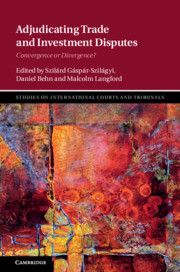Book contents
- Adjudicating Trade and Investment Disputes
- Studies on International Courts and Tribunals
- Adjudicating Trade and Investment Disputes
- Copyright page
- Contents
- Figures
- Tables
- Editors and Contributors
- Preface and Acknowledgements
- 1 Assessing Convergence in International Economic Disputes – A Framework
- Part I Dispute System Design
- Part II Use of Precedent across Regimes
- Part III Interpretive Powers and Adjudicative Behaviour
- 11 Epilogue: ‘Convergence’ Is a Many-Splendored Thing
- Index
1 - Assessing Convergence in International Economic Disputes – A Framework
Published online by Cambridge University Press: 25 June 2020
- Adjudicating Trade and Investment Disputes
- Studies on International Courts and Tribunals
- Adjudicating Trade and Investment Disputes
- Copyright page
- Contents
- Figures
- Tables
- Editors and Contributors
- Preface and Acknowledgements
- 1 Assessing Convergence in International Economic Disputes – A Framework
- Part I Dispute System Design
- Part II Use of Precedent across Regimes
- Part III Interpretive Powers and Adjudicative Behaviour
- 11 Epilogue: ‘Convergence’ Is a Many-Splendored Thing
- Index
Summary
Recent trends suggest that international economic law may be witnessing a renaissance of convergence – both parallel and intersectional. The adjudicative process also reveals signs of convergence. These diverse claims of convergence are of legal, empirical and normative interest. Yet, convergence discourse also warrants scepticism. This volume therefore aims to contribute to both the general debate on the fragmentation of international law and the discourse concerning the interplay between international trade and investment, with a particular focus on dispute settlement. It especially seeks to move beyond broad observations or singular case studies to provide an informed and wide-reaching assessment by investigating multiple standards, processes, mechanisms and behaviours. Methodologically, a normative stance is largely eschewed in favour of a range of ‘doctrinal,’ quantitative and qualitative methods that are used to address the research questions. Furthermore, in determining the extent of convergence, it is important to recognize that there is no bright line or clear yardstick for determining its nature or degree.
Keywords
- Type
- Chapter
- Information
- Adjudicating Trade and Investment DisputesConvergence or Divergence?, pp. 1 - 18Publisher: Cambridge University PressPrint publication year: 2020

